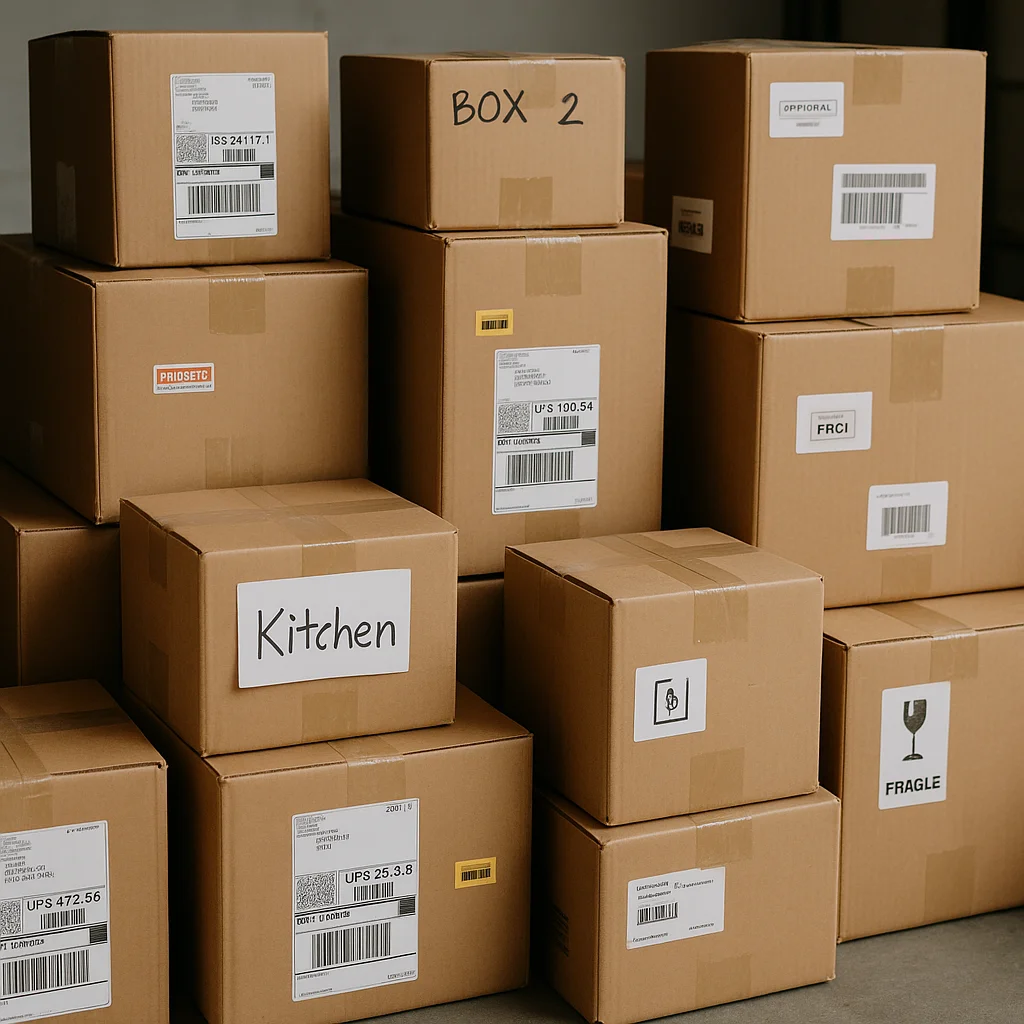Whether you’re preparing to send a single package or stocking up for a growing ecommerce business, finding reliable sources for shipping boxes is essential. This guide explores every major avenue-online and brick-and-mortar retailers, specialty packaging suppliers, wholesale distributors, and more-so you can select the best option for your budget, volume requirements, and delivery timeline.
1. Major Office Supply Retailers
Office supply chains offer convenience, moderate pricing, and a selection of standard box sizes. Their ubiquity makes them a go-to for last-minute needs.
- Staples
- Selection: Single‐wall and double-wall corrugated boxes, file boxes, moving boxes, mailers.
- Pricing: Individual boxes starting at around $1.50; volume discounts for multipacks.
- Services: In-store pick-up, next-day delivery on qualified orders, custom printing on boxes.
- Pros: Frequent promotions, membership rebates.
- Cons: Limited large or irregular sizes.
- Office Depot / OfficeMax
- Selection: Economy to heavy-duty corrugated boxes, mailers, bubble mailers.
- Pricing: Similar to Staples; multipack deals often better value than singles.
- Services: Free in-store pick-up, same-day delivery in select markets.
- Pros: Easy online configurator for box quantities.
- Cons: Custom sizes require minimum orders and longer lead times.
- FedEx Office (formerly Kinko’s)
- Selection: USPS and FedEx approved shipping boxes, padded envelopes, tube mailers.
- Pricing: Slightly higher per-unit cost but includes packaging tape, labels, and packing peanuts if needed.
- Services: Same-day turnaround; packing assistance; print-on-demand labels.
- Pros: One-stop shop for shipping and printing.
- Cons: Premium pricing; limited selection of large-format boxes.
2. National Shipping and Courier Services
Carrier outlets provide convenience and carrier-compatible packaging, though often at a markup.
- UPS Store
- Selection: UPS-branded corrugated boxes, padded envelopes, tubes.
- Pricing: Box sets priced to cover UPS’s shipping costs; singles cost $3–$7 each.
- Services: Professional packing, insurance, and drop-off.
- Pros: Guaranteed compatibility with UPS shipping services; expert packing help.
- Cons: Higher per-unit cost; fewer bulk options.
- USPS (United States Postal Service)
- Selection: Free Priority Mail and Priority Mail Express flat-rate boxes; regional rate boxes; padded envelopes.
- Pricing: Flat-rate: small ($9.65), medium ($17.05), large ($22.45) regardless of weight.
- Services: Free home delivery of boxes; free packaging materials via request.
- Pros: Attractive flat-rate shipping; convenient pickup scheduling.
- Cons: Limited to USPS services; custom size boxes not available.
- DHL and Other Couriers
- Selection: International shipping boxes, custom crate services.
- Pricing: Premium, based on service and destination.
- Pros: Expert handling for fragile and international freight.
- Cons: Expensive for domestic, standard shipments.
3. Online Packaging Retailers
For extensive variety, competitive pricing, and volume discounts, online packaging specialists excel-especially for businesses.
- Uline
- Selection: Thousands of SKUs: single-, double-, and triple-wall boxes; wood crates; foam-lined boxes; specialty mailers.
- Pricing: Wholesale pricing; discounts for bulk orders (pallet loads).
- Services: Next-day delivery in most U.S. markets; custom printing and design.
- Pros: Unmatched selection; easy reordering; robust CAD-based sizing tool.
- Cons: Minimum order quantities on custom jobs; shipping costs on small orders.
- PackagingSupplies.com
- Selection: Corrugated boxes, mailers, bubble wrap, void fill, pallets.
- Pricing: Competitive with Uline; free shipping on orders over a set threshold ($99–$149 depending on region).
- Services: Volume-based pricing tiers; custom box design services.
- Pros: Frequent free-ship promotions; live chat support.
- Cons: Limited brick-and-mortar presence.
- The Boxery
- Selection: Standard and retail packaging; eco-friendly and recyclable options; mailers; thermal insulated boxes.
- Pricing: Flat-rate “Box Packs” deals; incremental discounts by quantity.
- Services: Monthly subscription options for businesses; custom design.
- Pros: Transparent pricing; focus on green packaging solutions.
- Cons: Subscription model can be overkill for small shippers.
- Amazon
- Selection: Compressed lineup of best sellers; corrugated boxes, bubble mailers, padded poly envelopes.
- Pricing: Low prices on bulk packs for Prime members; same-day or 2-day shipping.
- Pros: Rapid delivery; massive user reviews.
- Cons: Selection limited to items stocked by Amazon; brand-agnostic quality.
4. Wholesale and Discount Outlets
If you need thousands of boxes on tight margins, consider wholesale liquidators, dollar stores, and surplus distributors.
- Dollar Stores (Dollar Tree, Family Dollar)
- Selection: Basic small to medium corrugated boxes; plastic storage bins.
- Pricing: $1.25 per box regardless of size.
- Pros: Ultra-low cost for low-volume needs.
- Cons: Inconsistent stock; only small to medium sizes.
- Liquidation and Surplus Suppliers
- Examples: Liquidation.com, BoxFox, OverstockBoxes.com.
- Selection: Overstocked, customer-returned, or slightly imperfect boxes at steep discounts.
- Pricing: 50–80% off standard wholesale rates.
- Pros: Excellent for businesses setting up clearance promotions or one-time events.
- Cons: Limited control over grades, sizes, or quantities. May require pallet-level purchases.
- Packaging Wholesalers
- Examples: Pratt Industries, International Paper.
- Selection: Bulk corrugated sheet and die-cut boxes; industrial crate solutions.
- Pricing: Negotiated contract pricing for high-volume clients.
- Services: Dedicated account managers; JIT replenishment; custom corrugation profiles.
- Pros: Ideal for manufacturers and large distributors.
- Cons: Long lead times for custom tooling; large minimum orders.
5. Local and Regional Suppliers
Small packaging businesses often cater to local markets with more personalized service and no shipping fees.
- Regional Corrugators
- Service Area: Varies by region; often within a 500-mile radius of their plant.
- Specialties: Custom box sizes with low MOQ, expedited local delivery.
- Pros: Lower shipping costs; ability to walk pallets to shipping docks.
- Cons: Selection limited to corrugated products; may lack retail packaging.
- Mom-and-Pop Packaging Stores
- Offer: Standard stock boxes, packing supplies, tape, labels, peanuts.
- Advantage: Flexibility on small orders, expert local advice, immediate pickup.
- Cons: Higher per-unit pricing; fewer volume discounts.
- Print Shops with Packaging Services
- Services: Packaging design, printing logos and handling instructions on boxes.
- Good Fit: Small businesses needing branded packaging in low to medium quantities (50–500 boxes).
- Turnaround: 1–2 weeks for design, proofing, and production.
- Cons: Setup fees and minimums often apply.
6. Eco-Friendly and Specialty Options
Growing environmental concerns drive demand for sustainable and specialized packaging solutions.
- EcoEnclose
- Materials: 100% recycled cardboard, compostable mailers, biodegradable tape.
- Certifications: FSC-certified, Green Seal, SFI chain of custody.
- Pricing: Slight premium over standard corrugated boxes (10–20%).
- Pros: Clear sustainability credentials; minimal plastic use.
- Cons: Slower lead times for custom orders.
- Noissue
- Focus: Custom printed, compostable mailers and boxes for subscription services and direct-to-consumer brands.
- MOQ: 500–1,000 units for custom printing; smaller for stock items.
- Pros: Unique unboxing experiences; vibrant design options.
- Cons: Higher design and setup costs.
- Saltbox Packaging
- Specialty: Waterproof, insulated boxes for food and perishables; reusability options.
- Pros: Protects temperature-sensitive goods; appeals to meal kit and specialty food markets.
- Cons: Substantial per-unit cost; heavier weight.
7. Customized Packaging Platforms
If “off-the-shelf” doesn’t fit your brand, these platforms streamline bespoke box design and production.
- Packlane
- Process: Online design tool for dielines, artwork upload, instant pricing.
- MOQ: As low as 25 boxes.
- Turnaround: 8–12 business days.
- Pros: No setup fees; free digital proofs and color samples.
- Cons: Expedited rush orders cost extra.
- Packhelp
- Offerings: Corrugated mailers, folding cartons, gable boxes, shipping boxes.
- MOQ: 50 units for standard sizes; 500 units for fully custom shapes.
- Pros: Eco-friendly materials; integrated shipping rates.
- Cons: Lead times up to 3 weeks for custom orders.
- Arka
- Platform: AI-powered pack size optimization; integrates with ecommerce platforms to recommend box sizes for every order.
- Pros: Reduces DIM weight fees; more efficient storage and shipping.
- Cons: Integration fees; annual subscription for software.
8. Key Considerations When Selecting a Supplier
Choosing the right source for shipping boxes goes beyond price and availability. Evaluate these factors:
- Volume Requirements
- Small-scale sellers benefit from retail and online marketplaces.
- High-volume shippers save most with wholesale distributors or direct corrugators.
- Customization Needs
- Custom sizes, printing, or branding require specialized platforms (Packlane, Noissue).
- Stock sizes with logo stamps are available from national carriers.
- Budget Constraints
- Dollar stores and liquidation outlets for minimal budgets.
- Premium suppliers (DHL, Saltbox) justify higher costs with specialized services.
- Lead Times
- Stock boxes: available same day or next day from retail and local suppliers.
- Custom boxes: 1–4 weeks depending on quantity and complexity.
- Shipping and Handling Costs
- Factor in box weight and DIM weight with carriers.
- Consider regional suppliers to reduce freight fees.
- Sustainability
- Look for recycled content certifications (FSC, SFI).
- Compostable and biodegradable options rising in availability.
- Convenience and Service
- In-house packing services at FedEx Office and UPS Store.
- Integrated shipping and packing solutions simplify logistics.
9. Practical Tips for Buying Shipping Boxes
- Standardize Your Sizes
- Reduce complexity by picking 3–5 box sizes that cover most orders.
- Negotiate better pricing with bulk commitments for those sizes.
- Order Samples First
- Test strength, closure methods, and fit before placing large orders.
- Bundle Supplies
- Purchase tape, bubble wrap, and labels together to qualify for free shipping.
- Watch for Deals and Clearance Lots
- Subscribe to Uline and PackagingSupplies.com newsletters for flash sales.
- Check liquidation auctions for oversized pallets of nearly new boxes.
- Monitor Inventory
- For businesses, integrate packaging supplier APIs to track low stock alerts.
- Implement just-in-time replenishment to free warehouse space.
- Consolidate Shipments
- Split small orders of packaging supplies to reach free shipping thresholds.
- Use regional carriers for heavy or bulky freight to save money.
Conclusion
Selecting the right place to buy shipping boxes depends on balancing convenience, cost, customization, and volume. For sporadic or low-volume needs, major office retailers and carrier stores excel; for high-volume or bespoke requirements, online packaging specialists and regional corrugators offer superior selection and pricing. By standardizing sizes, bundling supplies, and tapping eco-friendly options, you’ll optimize both your packaging budget and operational efficiency, ensuring every shipment arrives in perfect condition-on time and within budget.



Leave a Reply